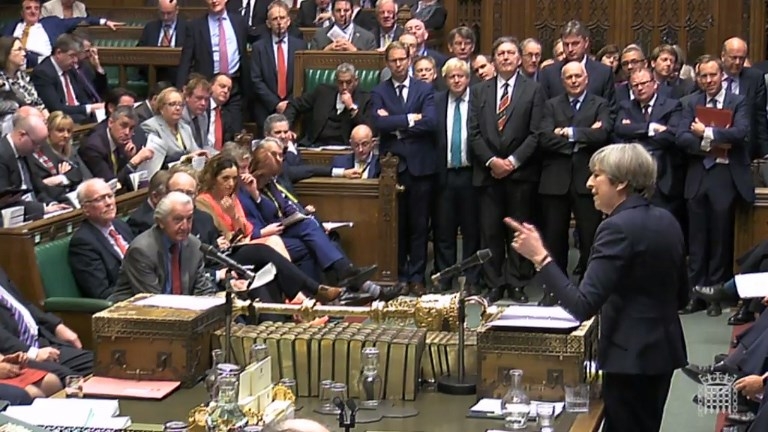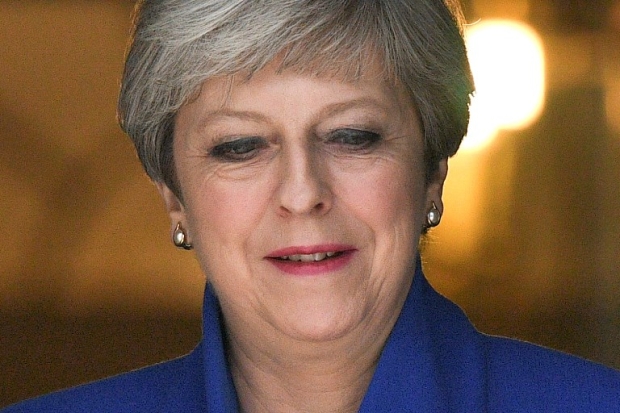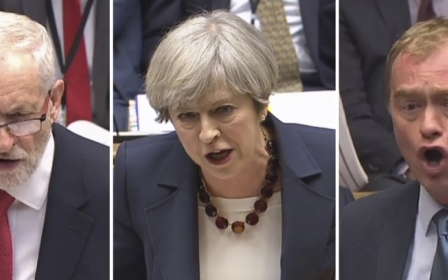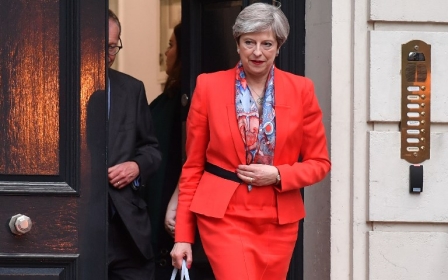What's next for British policy in the Middle East after the election

As Britain reels from yet another shock democratic exercise, foreign observers can be forgiven for looking with bewilderment at the British political system right now.
Accustomed as we all were in the decades before 2010 to clear majorities for one of two parties, British voters have developed a penchant for ripping up rulebooks and making idiots out of pollsters and other political cognoscenti. British elections are no longer boring affairs, even if the level of political debate certainly is tedious.
British elections are no longer boring affairs even if the level of political debate certainly is tedious
Yet for British foreign policy has anything really altered? The dominant theme, debate and focus of British policy was and will remain the relationship with the European Union and the conduct of the Brexit negotiations. These start, if the timetable still holds, in less than two weeks. Leaving the European Union is still Britain's chosen course.
Everything else follows in the Brexit slipstream. Whoever was prime minister would have to be devoted to overseeing the direction and content of these talks that affect every aspect of British life from the economy, to defence, to security, to immigration amongst other issues.
A divorce after four decades is a gargantuan exercise. The British government will be swamped by the sheer scale of what is ahead, which would have been the case even if the polls had delivered a strong and stable Tory government.
Britain vs itself
Moreover, the prime minister may have to weaken her support for the so-called hard Brexit and adopt a more consensual stance to win over support from other parties and indeed the House of Lords, which will argue that she failed to get a mandate for this form of Brexit.
'Yet another own goal, after Cameron now May, will make already complex negotiations even more complicated'
- Guy Verhofstadt, Brexit negotiator
That said, hard-line, anti-EU Tories will seek to prevent this, showing just how impossible it will be to govern effectively.
The negotiations between May's team, opposing wings in her party as well as other politicians may be every bit as awkward and tough as those with Michel Barnier, the EU's chief negotiator.
The European Parliament's Brexit negotiator, Guy Verhofstadt, didn't wait to stick the knife in: "Yet another own goal, after Cameron now May, will make already complex negotiations even more complicated."
Middle East policy as a side show
At best therefore, the Middle East will only appear in the prime minister's side-view mirror, and barely more than that for whoever is foreign secretary. The tendency will be to go with whatever international consensus there is, something that might be tougher given the increasing rifts between the Trump presidency and key EU states such as France and Germany.
That said, the Foreign Office will be anxious to play a role in the calming the Gulf Cooperation Council crisis over Qatar, now under siege from its neighbours and a major supplier of gas to the UK. The last thing Britain needs is to be compelled to pick sides, and the sooner de-escalation sets in the better.
The government will wish to avoid any debate over human rights issues that could prevent post-EU trade deals if it can
What is for certain is that this parliament does not look like one that will endorse British military intervention overseas. Out the window goes Prime Minister Theresa May’s proposal to hold a vote to authorise the use of force in Syria against the regime forces to back up any future American strikes. Many on her backbenches are longstanding opponents of such interventions, while the other parties are typically hostile not least if it involves hugging on to the coat-tails of Donald Trump.
In this Brexit slipstream, trade will be the primary concern. Preparing the ground for new post-EU deals is already a priority, so the government will wish to avoid any debate over human rights issues that could prevent such deals if it can.
READ MORE ► Made in Britain, tested on Yemenis: The reality of working for the bombmakers
Yet with no majority, this may not be possible. Most of the non-Conservative MPs have expressed huge concerns about the Saudi-led war on Yemen, something that will be tested even further as the humanitarian situation in the Arab world's poorest country gets even worse.
Some Tories are similarly worried. Pressure will mount on the government to limit sales of arms to Saudi Arabia. At a minimum, it will be an issue that opponents will use to weaken May further.
Security and human rights
Much of the election campaign was brutally interrupted by two terrorist atrocities. How the government addresses this security threat will also be under the microscope and a divisive issue between the parties.
Public opinion remains broadly sympathetic to Palestinian rights so this very pro-Israeli prime minister is hugely out of line with popular sentiment
Labour, the largest opposition party, will demand increased police numbers. Others will reject any attempt by the prime minister to rip up human rights legislation, a promise she made on the eve of the polls. On the doorstep of 10 Downing Street, May laid down the gauntlet on this issue by promising to push forward with these changes and daring Labour and others to oppose her.
On Israel-Palestine, this parliament looks as if it will be considerably less hostile to Palestinian aspirations. The government will, in all probability, be able to resist the demand to recognise the state of Palestine but it will not be so easy.
Public opinion remains broadly sympathetic to Palestinian rights so this very pro-Israeli prime minister is hugely out of line with popular sentiment. She might wish to reconsider her desire to celebrate the Balfour Declaration with pride later this year with the Israeli prime minister at her side. The anti-Palestinian contingent of MPs may find that tough.
And that is before the car crash of the state visit of Donald Trump to the UK later this year, an invitation that May may now be regretting she agreed to.
The prime minister tried to press a business-as-usual approach, of getting back to work, to conjure certainty from the clouds of uncertainty. It will be some time until these clouds are lifted.
- Chris Doyle is the director of Council for Arab-British Understanding. As the lead spokesperson for CAABU and as an expert on the region, he is a frequent commentator on TV and radio and gives numerous talks around the country on issues such as the Arab Spring, Libya, Syria, Palestine, Iraq, Islamophobia and the Arabs in Britain.
The views expressed in this article belong to the author and do not necessarily reflect the editorial policy of Middle East Eye.
Photo: Theresa May discusses Brexit in the British parliament in 2016 (AFP)
Middle East Eye propose une couverture et une analyse indépendantes et incomparables du Moyen-Orient, de l’Afrique du Nord et d’autres régions du monde. Pour en savoir plus sur la reprise de ce contenu et les frais qui s’appliquent, veuillez remplir ce formulaire [en anglais]. Pour en savoir plus sur MEE, cliquez ici [en anglais].






